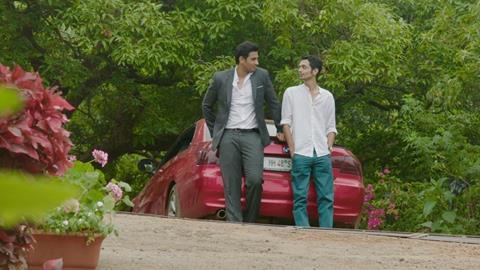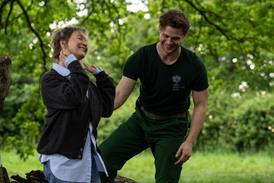Sudhanshu Saria bravely steps forward as a voice for India’s gay community with his first feature Loev that has its world premiere in the Tridens First Feature Film Competition at the Black Night Film Festival.

At a time of unprecedented economic growth for India, the country seems to be moving backwards when it comes to civil rights. Two years ago, its Supreme Court overturned a previous ruling that criminalized sodomy making it punishable by life imprisonment.
The director accepts the possibility the film may be banned in his home country, choosing instead to speak out about a victimised population who might otherwise remain silent under the domineering shadow of Bollywood’s machismo and the legal threat from the conservative government.
Screen spoke with Saria about his challenges in making the film. International sales are handled by Wide Management.
Why did you decide on this story for your first film?
Before I moved to Mumbai - I was living in LA debating gay marriage and attending rallies. And then I moved to India - where on the complete opposite side of the spectrum - peaceful loving citizens suddenly woke up as criminals because of this law that was overturned two years ago [in 2013]. In a way, the most political thing you can do is go into someone’s bedroom. So I did that to give voice to this situation and dignity to these characters.
How would you describe the story between the two men - ‘Jai’ played by Shiv Pandit and ‘Sahil’ played by Dhruv Ganesh?
Jay is a Wall Street banker living in Manhattan. He comes to Bombay [Mumbai] to do a business deal. Over the course of 48 hours, he sets off on a getaway with his buddy Sahil to Mahabaleshwar which is essentially a religious Hindu city. When they come back - it is very much about things said, and not said. It’s about how you deal with something you haven’t confronted.
Most people say it’s a romance, not a gay film. The genre is riddled with cliches: the sex scene, twinks and six-packs, the ‘coming out’ scene that all end in being ostracized or suicide. If I was a teenager growing up and watching these films - my god, I would have wanted to go back in the closet. It’s terribly oppressive. And so I just wanted to make a film showing there is more to this life than that.
Are you concerned about how this will affect the film’s theatrical release in India?
I knew I needed local cooperation - I needed locations and I needed to be able to use their streets. So I needed them to think I was making an appropriate film. If I had been totally honest, I probably wouldn’t have gotten the locations like the international airport and these streets.
So I just kept telling people, ‘It is a story about friendship’. It is a shame in a way. All of our marketing materials are ambiguous so you don’t get a real sense of their relationship. We have been dealing with it long enough. I am ready to be truthful - this is what we are, here is what we are doing. And if that affects the film’s possible release in India, then I have to accept that.
Did you have trouble financing the film?
Myself and producing partners made the film for less than 1mill($). We received a small amount of money through crowd funding, which I find useful to gauge the audience’s reaction. And then we had private equity - some of which came from our own pockets with deferred salaries. This helped give everyone who contributed incredible ownership.
What was it like filming in India after having worked in the US for an extensive period?
I was born in India - but when someone asks where I am from - I have a hard time saying that. I feel like a citizen of the world.
So I was worried people would ask ‘Have you lived in Mumbai? Do you know about gay relationships here?’ But out of fear comes this sense of desire to get close - to really observe the details of the life around you. That gave me the push to tell this story. And by turning it into a story about men - it became urgent.
How did you cast the film?
Dhruv Ganesh had every intention of becoming the next Bollywood star. I remember calling him to read for Sahil. He did it so well that I took him aside and told him what the film was really about. He said ‘I want to be a hero. I can’t do this.’ And I understood that - I told him not to take the role. I don’t want to be the person who manipulates someone into doing something. But then he called me later and told me he was incredibly nervous but he would take the role.
Shiv Pandit is well known in Bollywood. I was surprised there too when he said he would take the role of Jay. But he was very believable in this role as well.
Can you talk about the death of Dhruv Ganesh?
The film was shot and completed last year. In January I got a phone call saying he was very sick with tuberculosis. It quickly went from bad to worse. He died in the hospital in January. It’s taken me months to process. I was so excited to present him to the industry in Mumbai. Despite not being gay - he has achieved such a naturalistic performance. It’s not a sympathy move - but this is his truth and it’s important to share that.
It’s the biggest compliment to me that his parents came here (in Tallinn), to see the film. I also feel a sense of responsibility since this is his last film.
How are you hoping the film will influence India’s gay community?
India seems to be moving backwards into intolerance. We are making a film that gives homosexual men the dignity of not being reduced to a stereotype. It’s a symbol just like the Section 377 law is a symbol and symbols are important.
The friendships I encounter in the gay community seem to be about much more complex things. So I wanted this story to shed light on issues that crop up in gay life, the emotions that are often denied or overlooked. I want people to be able to speak more freely about this - it’s something for the next generation.


































No comments yet